Advanced Financial Accounting Report: Beachlife Ltd Issues
VerifiedAdded on 2020/05/16
|7
|1555
|95
Report
AI Summary
This report, prepared by Magenta and Associates for Beachlife Ltd, addresses critical accounting issues encountered by the company. The report focuses on the application of AASB 137 to determine the correct accounting treatments for a pending court case concerning patent infringement and a sale treaty with a maintenance clause. The analysis includes assessing the probability of liabilities, determining the need for provisions and contingent liabilities, and recommending appropriate financial reporting. The report emphasizes the importance of accurate accounting treatments for reliable financial reports and provides detailed justifications based on Australian accounting standards. The solutions provided ensure the dependability of financial data and offers clear explanations for the recommendations.
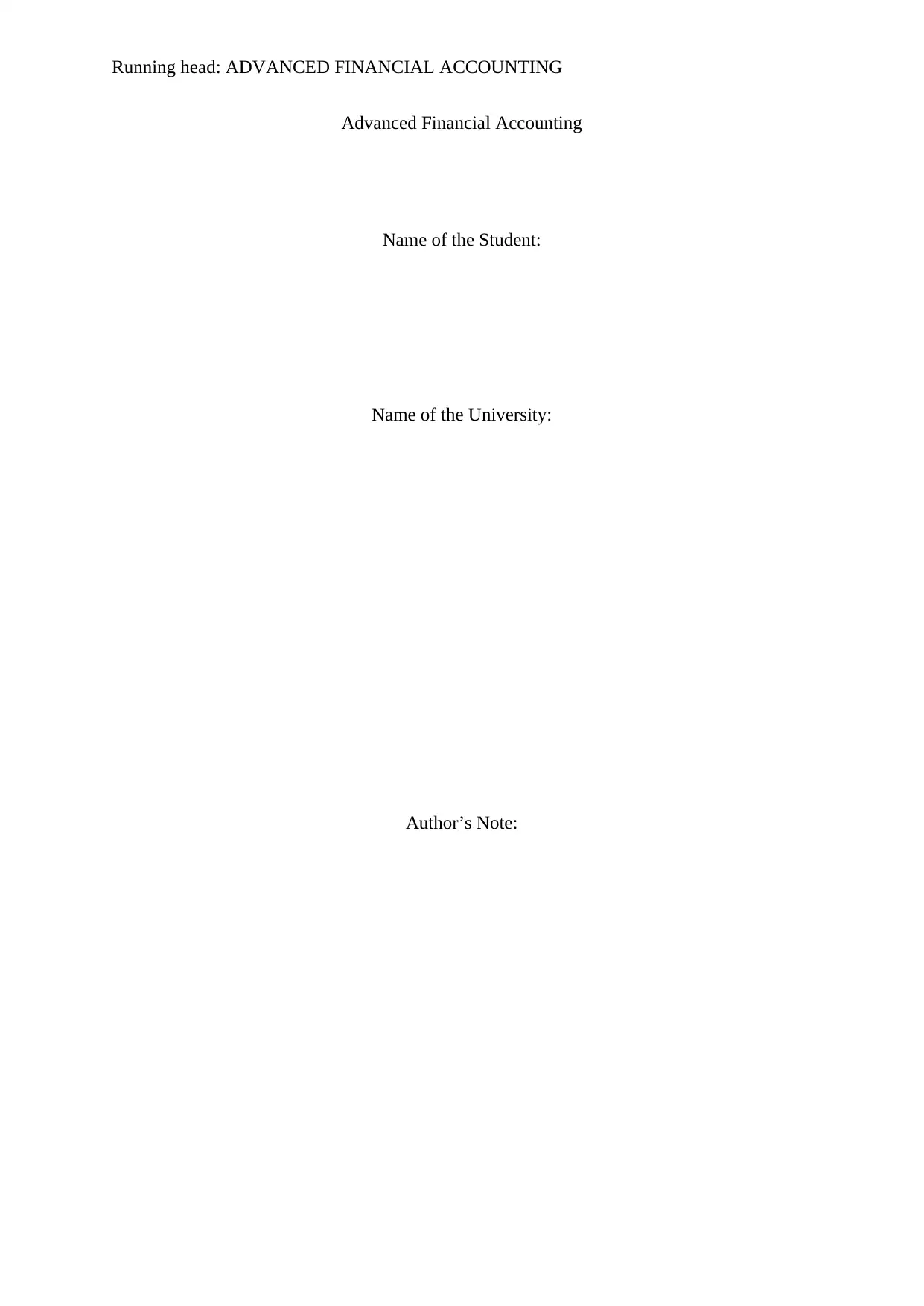
Running head: ADVANCED FINANCIAL ACCOUNTING
Advanced Financial Accounting
Name of the Student:
Name of the University:
Author’s Note:
Advanced Financial Accounting
Name of the Student:
Name of the University:
Author’s Note:
Paraphrase This Document
Need a fresh take? Get an instant paraphrase of this document with our AI Paraphraser
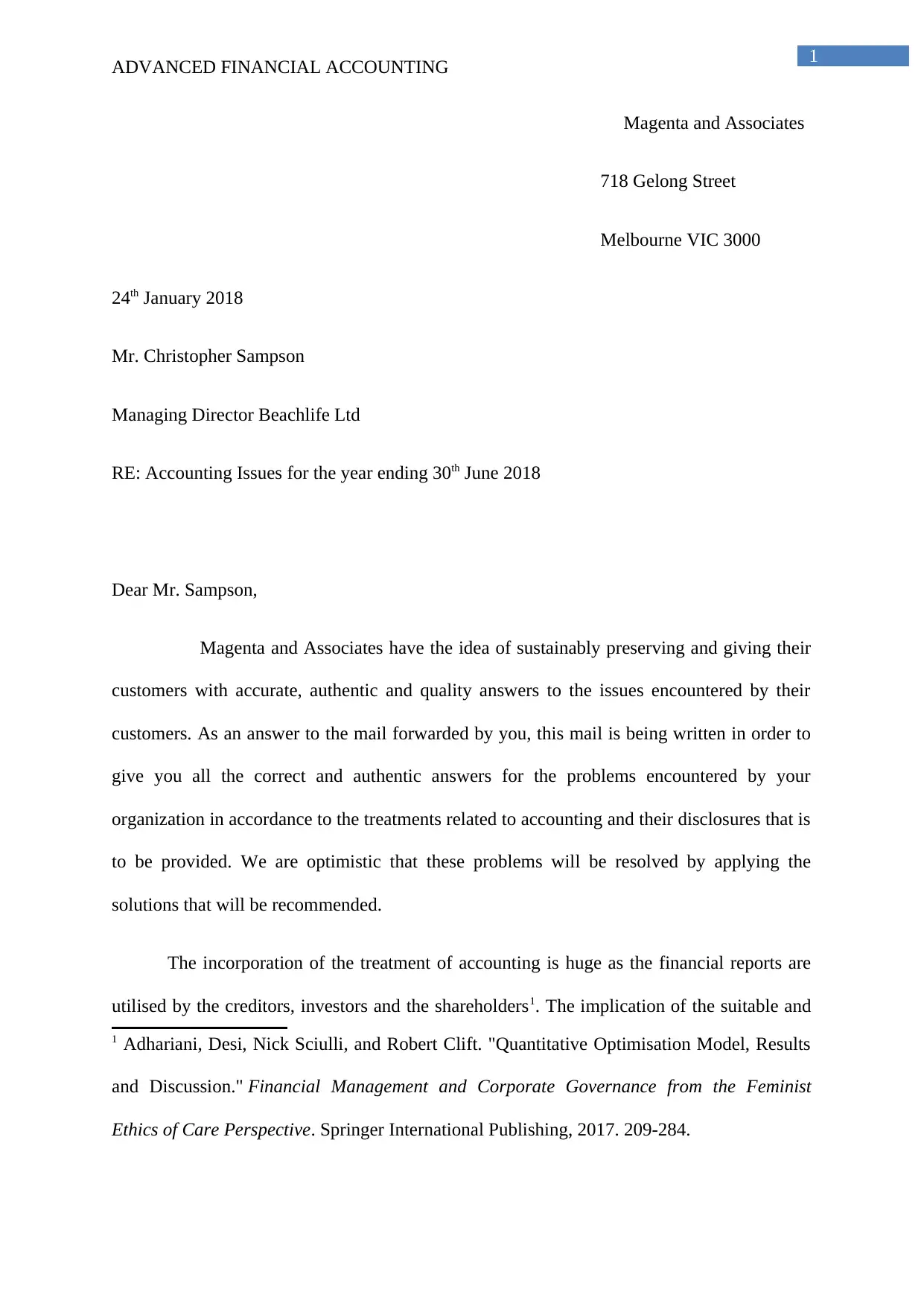
1
ADVANCED FINANCIAL ACCOUNTING
Magenta and Associates
718 Gelong Street
Melbourne VIC 3000
24th January 2018
Mr. Christopher Sampson
Managing Director Beachlife Ltd
RE: Accounting Issues for the year ending 30th June 2018
Dear Mr. Sampson,
Magenta and Associates have the idea of sustainably preserving and giving their
customers with accurate, authentic and quality answers to the issues encountered by their
customers. As an answer to the mail forwarded by you, this mail is being written in order to
give you all the correct and authentic answers for the problems encountered by your
organization in accordance to the treatments related to accounting and their disclosures that is
to be provided. We are optimistic that these problems will be resolved by applying the
solutions that will be recommended.
The incorporation of the treatment of accounting is huge as the financial reports are
utilised by the creditors, investors and the shareholders1. The implication of the suitable and
1 Adhariani, Desi, Nick Sciulli, and Robert Clift. "Quantitative Optimisation Model, Results
and Discussion." Financial Management and Corporate Governance from the Feminist
Ethics of Care Perspective. Springer International Publishing, 2017. 209-284.
ADVANCED FINANCIAL ACCOUNTING
Magenta and Associates
718 Gelong Street
Melbourne VIC 3000
24th January 2018
Mr. Christopher Sampson
Managing Director Beachlife Ltd
RE: Accounting Issues for the year ending 30th June 2018
Dear Mr. Sampson,
Magenta and Associates have the idea of sustainably preserving and giving their
customers with accurate, authentic and quality answers to the issues encountered by their
customers. As an answer to the mail forwarded by you, this mail is being written in order to
give you all the correct and authentic answers for the problems encountered by your
organization in accordance to the treatments related to accounting and their disclosures that is
to be provided. We are optimistic that these problems will be resolved by applying the
solutions that will be recommended.
The incorporation of the treatment of accounting is huge as the financial reports are
utilised by the creditors, investors and the shareholders1. The implication of the suitable and
1 Adhariani, Desi, Nick Sciulli, and Robert Clift. "Quantitative Optimisation Model, Results
and Discussion." Financial Management and Corporate Governance from the Feminist
Ethics of Care Perspective. Springer International Publishing, 2017. 209-284.
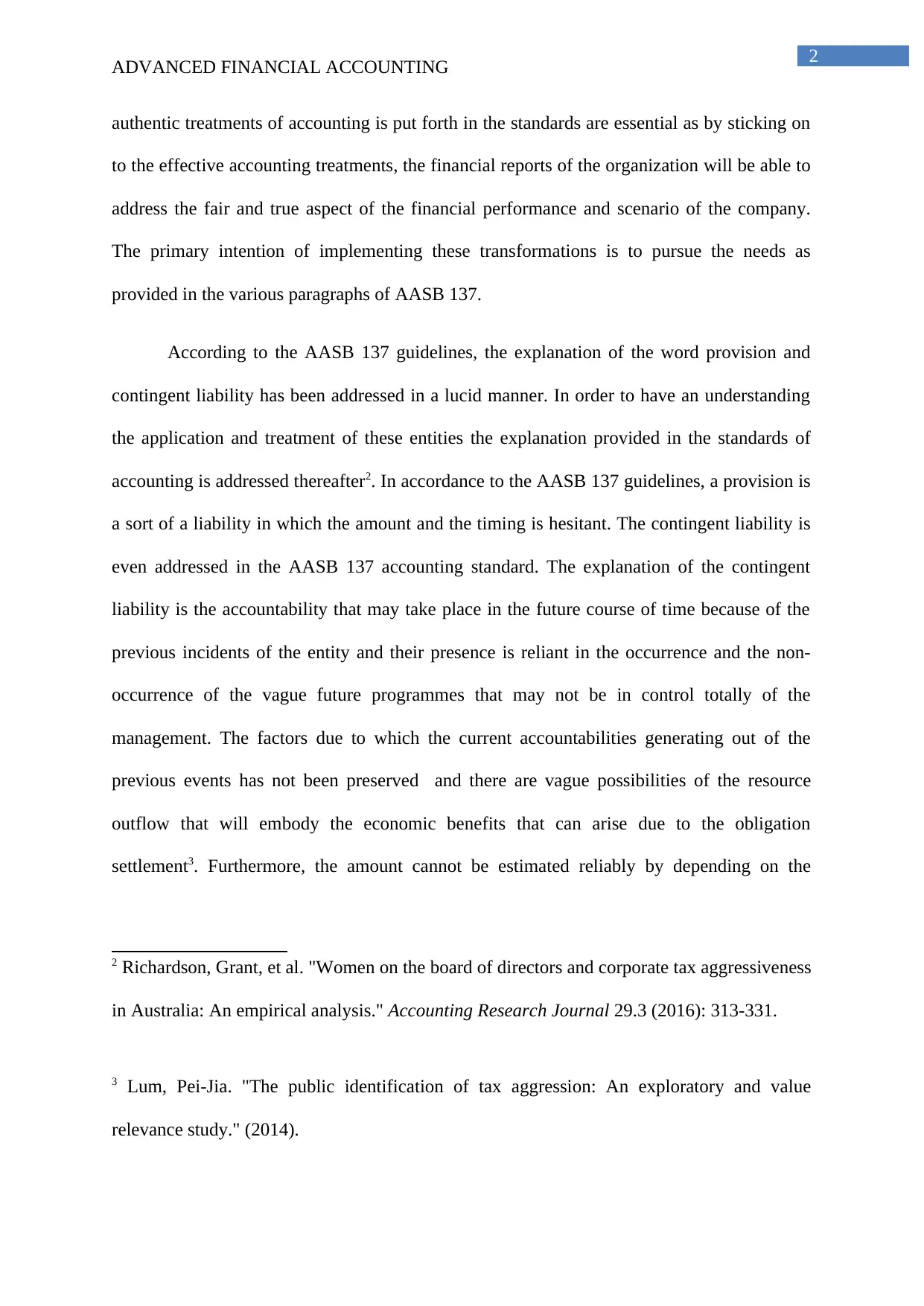
2
ADVANCED FINANCIAL ACCOUNTING
authentic treatments of accounting is put forth in the standards are essential as by sticking on
to the effective accounting treatments, the financial reports of the organization will be able to
address the fair and true aspect of the financial performance and scenario of the company.
The primary intention of implementing these transformations is to pursue the needs as
provided in the various paragraphs of AASB 137.
According to the AASB 137 guidelines, the explanation of the word provision and
contingent liability has been addressed in a lucid manner. In order to have an understanding
the application and treatment of these entities the explanation provided in the standards of
accounting is addressed thereafter2. In accordance to the AASB 137 guidelines, a provision is
a sort of a liability in which the amount and the timing is hesitant. The contingent liability is
even addressed in the AASB 137 accounting standard. The explanation of the contingent
liability is the accountability that may take place in the future course of time because of the
previous incidents of the entity and their presence is reliant in the occurrence and the non-
occurrence of the vague future programmes that may not be in control totally of the
management. The factors due to which the current accountabilities generating out of the
previous events has not been preserved and there are vague possibilities of the resource
outflow that will embody the economic benefits that can arise due to the obligation
settlement3. Furthermore, the amount cannot be estimated reliably by depending on the
2 Richardson, Grant, et al. "Women on the board of directors and corporate tax aggressiveness
in Australia: An empirical analysis." Accounting Research Journal 29.3 (2016): 313-331.
3 Lum, Pei-Jia. "The public identification of tax aggression: An exploratory and value
relevance study." (2014).
ADVANCED FINANCIAL ACCOUNTING
authentic treatments of accounting is put forth in the standards are essential as by sticking on
to the effective accounting treatments, the financial reports of the organization will be able to
address the fair and true aspect of the financial performance and scenario of the company.
The primary intention of implementing these transformations is to pursue the needs as
provided in the various paragraphs of AASB 137.
According to the AASB 137 guidelines, the explanation of the word provision and
contingent liability has been addressed in a lucid manner. In order to have an understanding
the application and treatment of these entities the explanation provided in the standards of
accounting is addressed thereafter2. In accordance to the AASB 137 guidelines, a provision is
a sort of a liability in which the amount and the timing is hesitant. The contingent liability is
even addressed in the AASB 137 accounting standard. The explanation of the contingent
liability is the accountability that may take place in the future course of time because of the
previous incidents of the entity and their presence is reliant in the occurrence and the non-
occurrence of the vague future programmes that may not be in control totally of the
management. The factors due to which the current accountabilities generating out of the
previous events has not been preserved and there are vague possibilities of the resource
outflow that will embody the economic benefits that can arise due to the obligation
settlement3. Furthermore, the amount cannot be estimated reliably by depending on the
2 Richardson, Grant, et al. "Women on the board of directors and corporate tax aggressiveness
in Australia: An empirical analysis." Accounting Research Journal 29.3 (2016): 313-331.
3 Lum, Pei-Jia. "The public identification of tax aggression: An exploratory and value
relevance study." (2014).
⊘ This is a preview!⊘
Do you want full access?
Subscribe today to unlock all pages.

Trusted by 1+ million students worldwide
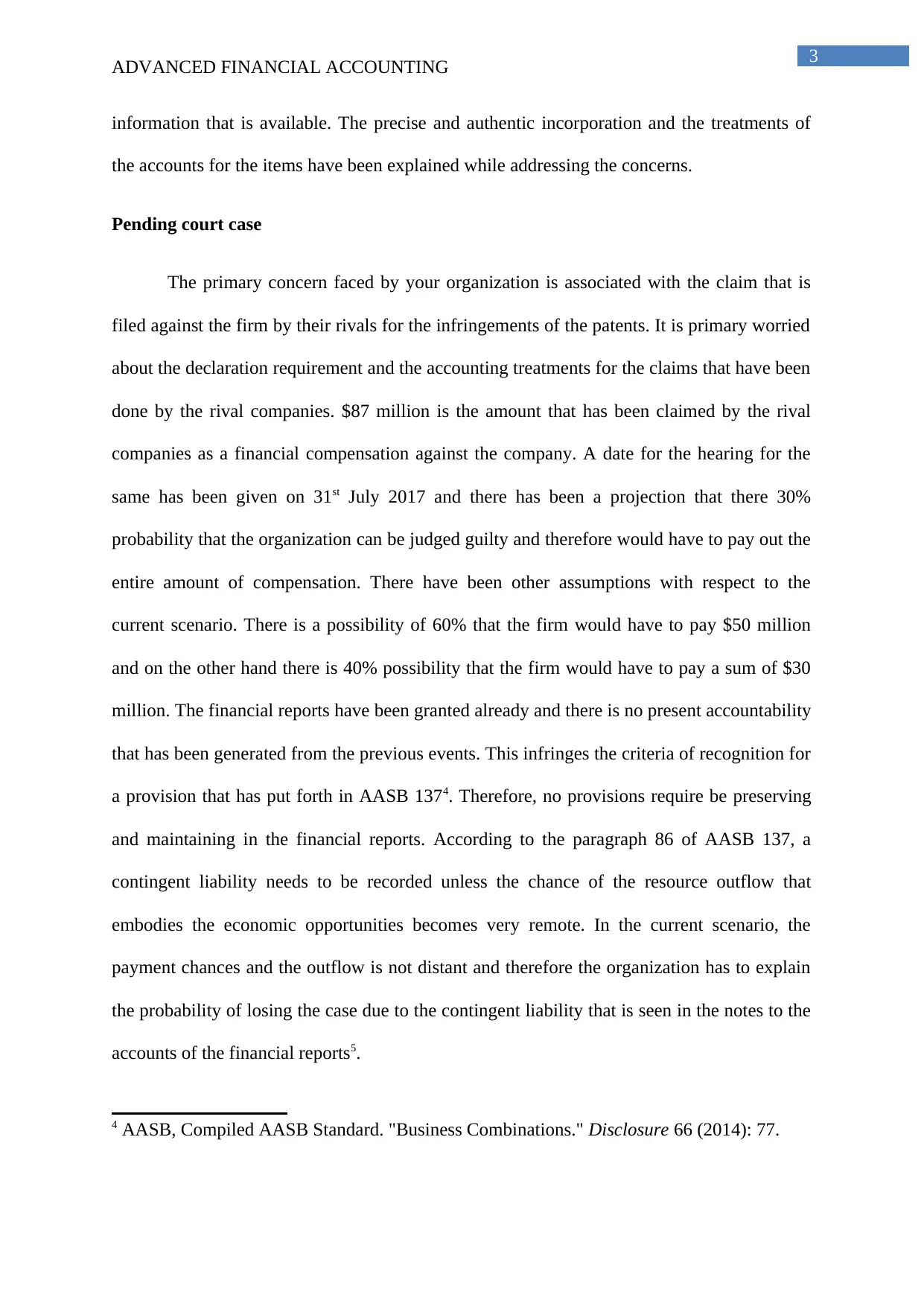
3
ADVANCED FINANCIAL ACCOUNTING
information that is available. The precise and authentic incorporation and the treatments of
the accounts for the items have been explained while addressing the concerns.
Pending court case
The primary concern faced by your organization is associated with the claim that is
filed against the firm by their rivals for the infringements of the patents. It is primary worried
about the declaration requirement and the accounting treatments for the claims that have been
done by the rival companies. $87 million is the amount that has been claimed by the rival
companies as a financial compensation against the company. A date for the hearing for the
same has been given on 31st July 2017 and there has been a projection that there 30%
probability that the organization can be judged guilty and therefore would have to pay out the
entire amount of compensation. There have been other assumptions with respect to the
current scenario. There is a possibility of 60% that the firm would have to pay $50 million
and on the other hand there is 40% possibility that the firm would have to pay a sum of $30
million. The financial reports have been granted already and there is no present accountability
that has been generated from the previous events. This infringes the criteria of recognition for
a provision that has put forth in AASB 1374. Therefore, no provisions require be preserving
and maintaining in the financial reports. According to the paragraph 86 of AASB 137, a
contingent liability needs to be recorded unless the chance of the resource outflow that
embodies the economic opportunities becomes very remote. In the current scenario, the
payment chances and the outflow is not distant and therefore the organization has to explain
the probability of losing the case due to the contingent liability that is seen in the notes to the
accounts of the financial reports5.
4 AASB, Compiled AASB Standard. "Business Combinations." Disclosure 66 (2014): 77.
ADVANCED FINANCIAL ACCOUNTING
information that is available. The precise and authentic incorporation and the treatments of
the accounts for the items have been explained while addressing the concerns.
Pending court case
The primary concern faced by your organization is associated with the claim that is
filed against the firm by their rivals for the infringements of the patents. It is primary worried
about the declaration requirement and the accounting treatments for the claims that have been
done by the rival companies. $87 million is the amount that has been claimed by the rival
companies as a financial compensation against the company. A date for the hearing for the
same has been given on 31st July 2017 and there has been a projection that there 30%
probability that the organization can be judged guilty and therefore would have to pay out the
entire amount of compensation. There have been other assumptions with respect to the
current scenario. There is a possibility of 60% that the firm would have to pay $50 million
and on the other hand there is 40% possibility that the firm would have to pay a sum of $30
million. The financial reports have been granted already and there is no present accountability
that has been generated from the previous events. This infringes the criteria of recognition for
a provision that has put forth in AASB 1374. Therefore, no provisions require be preserving
and maintaining in the financial reports. According to the paragraph 86 of AASB 137, a
contingent liability needs to be recorded unless the chance of the resource outflow that
embodies the economic opportunities becomes very remote. In the current scenario, the
payment chances and the outflow is not distant and therefore the organization has to explain
the probability of losing the case due to the contingent liability that is seen in the notes to the
accounts of the financial reports5.
4 AASB, Compiled AASB Standard. "Business Combinations." Disclosure 66 (2014): 77.
Paraphrase This Document
Need a fresh take? Get an instant paraphrase of this document with our AI Paraphraser
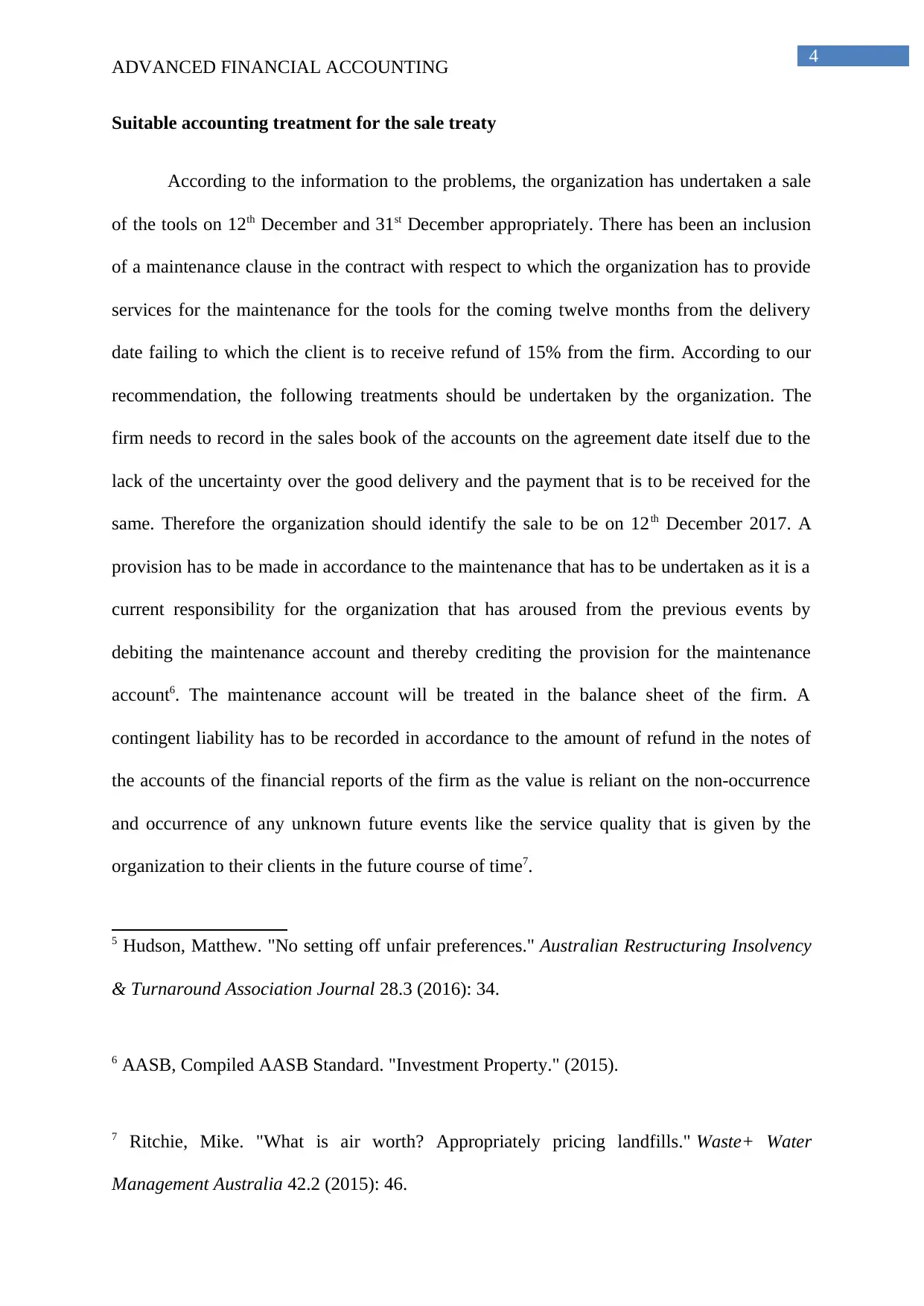
4
ADVANCED FINANCIAL ACCOUNTING
Suitable accounting treatment for the sale treaty
According to the information to the problems, the organization has undertaken a sale
of the tools on 12th December and 31st December appropriately. There has been an inclusion
of a maintenance clause in the contract with respect to which the organization has to provide
services for the maintenance for the tools for the coming twelve months from the delivery
date failing to which the client is to receive refund of 15% from the firm. According to our
recommendation, the following treatments should be undertaken by the organization. The
firm needs to record in the sales book of the accounts on the agreement date itself due to the
lack of the uncertainty over the good delivery and the payment that is to be received for the
same. Therefore the organization should identify the sale to be on 12th December 2017. A
provision has to be made in accordance to the maintenance that has to be undertaken as it is a
current responsibility for the organization that has aroused from the previous events by
debiting the maintenance account and thereby crediting the provision for the maintenance
account6. The maintenance account will be treated in the balance sheet of the firm. A
contingent liability has to be recorded in accordance to the amount of refund in the notes of
the accounts of the financial reports of the firm as the value is reliant on the non-occurrence
and occurrence of any unknown future events like the service quality that is given by the
organization to their clients in the future course of time7.
5 Hudson, Matthew. "No setting off unfair preferences." Australian Restructuring Insolvency
& Turnaround Association Journal 28.3 (2016): 34.
6 AASB, Compiled AASB Standard. "Investment Property." (2015).
7 Ritchie, Mike. "What is air worth? Appropriately pricing landfills." Waste+ Water
Management Australia 42.2 (2015): 46.
ADVANCED FINANCIAL ACCOUNTING
Suitable accounting treatment for the sale treaty
According to the information to the problems, the organization has undertaken a sale
of the tools on 12th December and 31st December appropriately. There has been an inclusion
of a maintenance clause in the contract with respect to which the organization has to provide
services for the maintenance for the tools for the coming twelve months from the delivery
date failing to which the client is to receive refund of 15% from the firm. According to our
recommendation, the following treatments should be undertaken by the organization. The
firm needs to record in the sales book of the accounts on the agreement date itself due to the
lack of the uncertainty over the good delivery and the payment that is to be received for the
same. Therefore the organization should identify the sale to be on 12th December 2017. A
provision has to be made in accordance to the maintenance that has to be undertaken as it is a
current responsibility for the organization that has aroused from the previous events by
debiting the maintenance account and thereby crediting the provision for the maintenance
account6. The maintenance account will be treated in the balance sheet of the firm. A
contingent liability has to be recorded in accordance to the amount of refund in the notes of
the accounts of the financial reports of the firm as the value is reliant on the non-occurrence
and occurrence of any unknown future events like the service quality that is given by the
organization to their clients in the future course of time7.
5 Hudson, Matthew. "No setting off unfair preferences." Australian Restructuring Insolvency
& Turnaround Association Journal 28.3 (2016): 34.
6 AASB, Compiled AASB Standard. "Investment Property." (2015).
7 Ritchie, Mike. "What is air worth? Appropriately pricing landfills." Waste+ Water
Management Australia 42.2 (2015): 46.
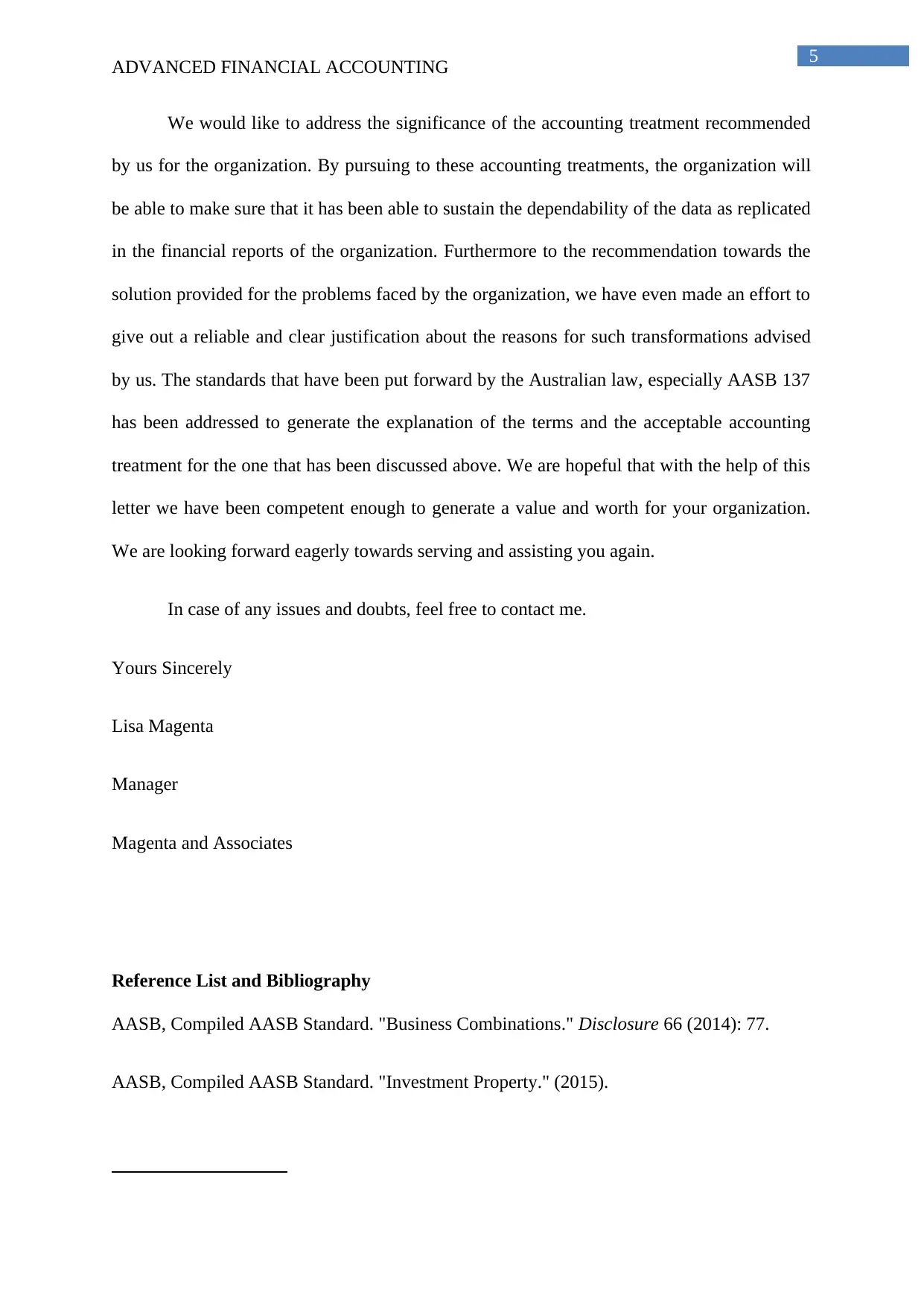
5
ADVANCED FINANCIAL ACCOUNTING
We would like to address the significance of the accounting treatment recommended
by us for the organization. By pursuing to these accounting treatments, the organization will
be able to make sure that it has been able to sustain the dependability of the data as replicated
in the financial reports of the organization. Furthermore to the recommendation towards the
solution provided for the problems faced by the organization, we have even made an effort to
give out a reliable and clear justification about the reasons for such transformations advised
by us. The standards that have been put forward by the Australian law, especially AASB 137
has been addressed to generate the explanation of the terms and the acceptable accounting
treatment for the one that has been discussed above. We are hopeful that with the help of this
letter we have been competent enough to generate a value and worth for your organization.
We are looking forward eagerly towards serving and assisting you again.
In case of any issues and doubts, feel free to contact me.
Yours Sincerely
Lisa Magenta
Manager
Magenta and Associates
Reference List and Bibliography
AASB, Compiled AASB Standard. "Business Combinations." Disclosure 66 (2014): 77.
AASB, Compiled AASB Standard. "Investment Property." (2015).
ADVANCED FINANCIAL ACCOUNTING
We would like to address the significance of the accounting treatment recommended
by us for the organization. By pursuing to these accounting treatments, the organization will
be able to make sure that it has been able to sustain the dependability of the data as replicated
in the financial reports of the organization. Furthermore to the recommendation towards the
solution provided for the problems faced by the organization, we have even made an effort to
give out a reliable and clear justification about the reasons for such transformations advised
by us. The standards that have been put forward by the Australian law, especially AASB 137
has been addressed to generate the explanation of the terms and the acceptable accounting
treatment for the one that has been discussed above. We are hopeful that with the help of this
letter we have been competent enough to generate a value and worth for your organization.
We are looking forward eagerly towards serving and assisting you again.
In case of any issues and doubts, feel free to contact me.
Yours Sincerely
Lisa Magenta
Manager
Magenta and Associates
Reference List and Bibliography
AASB, Compiled AASB Standard. "Business Combinations." Disclosure 66 (2014): 77.
AASB, Compiled AASB Standard. "Investment Property." (2015).
⊘ This is a preview!⊘
Do you want full access?
Subscribe today to unlock all pages.

Trusted by 1+ million students worldwide
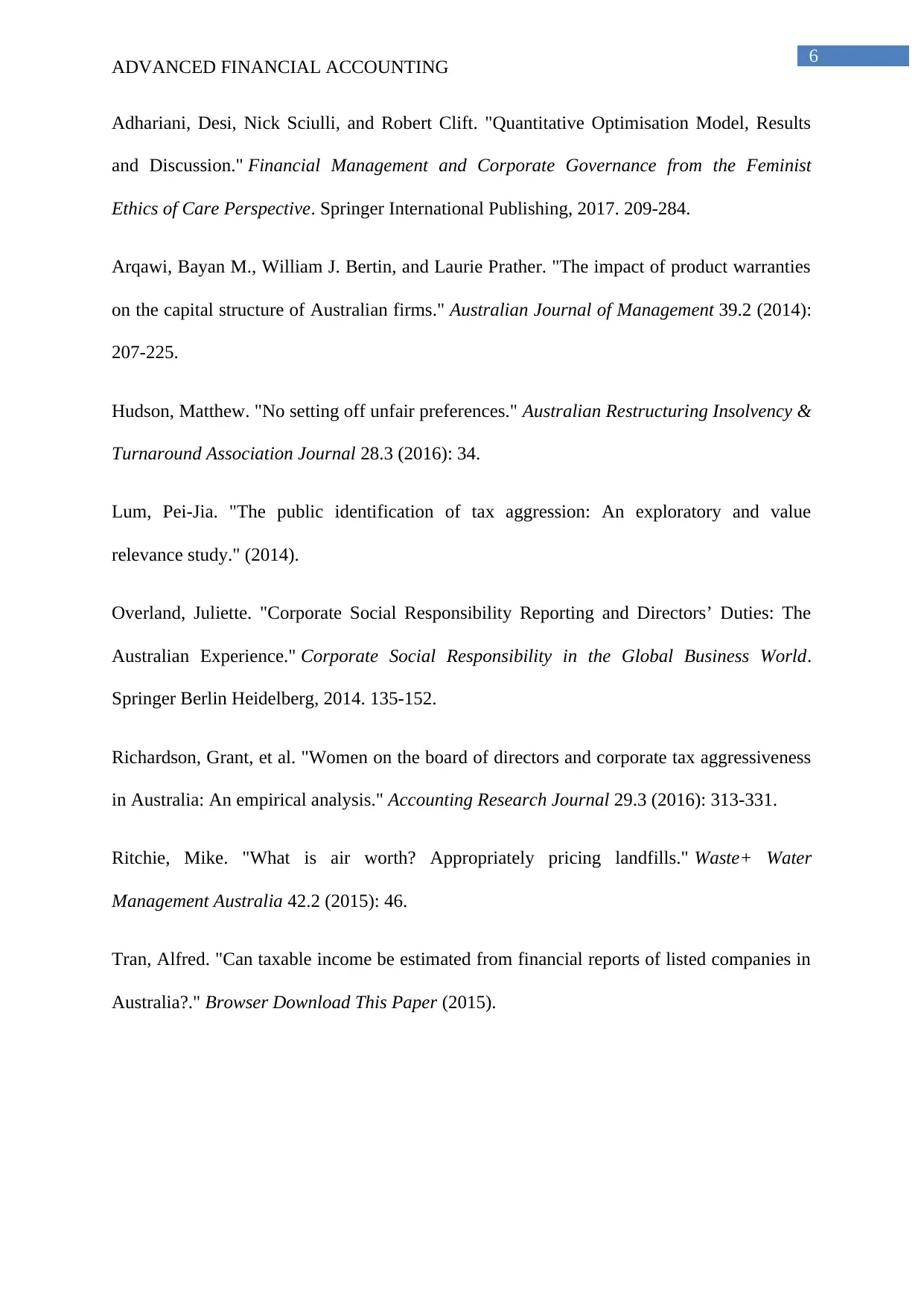
6
ADVANCED FINANCIAL ACCOUNTING
Adhariani, Desi, Nick Sciulli, and Robert Clift. "Quantitative Optimisation Model, Results
and Discussion." Financial Management and Corporate Governance from the Feminist
Ethics of Care Perspective. Springer International Publishing, 2017. 209-284.
Arqawi, Bayan M., William J. Bertin, and Laurie Prather. "The impact of product warranties
on the capital structure of Australian firms." Australian Journal of Management 39.2 (2014):
207-225.
Hudson, Matthew. "No setting off unfair preferences." Australian Restructuring Insolvency &
Turnaround Association Journal 28.3 (2016): 34.
Lum, Pei-Jia. "The public identification of tax aggression: An exploratory and value
relevance study." (2014).
Overland, Juliette. "Corporate Social Responsibility Reporting and Directors’ Duties: The
Australian Experience." Corporate Social Responsibility in the Global Business World.
Springer Berlin Heidelberg, 2014. 135-152.
Richardson, Grant, et al. "Women on the board of directors and corporate tax aggressiveness
in Australia: An empirical analysis." Accounting Research Journal 29.3 (2016): 313-331.
Ritchie, Mike. "What is air worth? Appropriately pricing landfills." Waste+ Water
Management Australia 42.2 (2015): 46.
Tran, Alfred. "Can taxable income be estimated from financial reports of listed companies in
Australia?." Browser Download This Paper (2015).
ADVANCED FINANCIAL ACCOUNTING
Adhariani, Desi, Nick Sciulli, and Robert Clift. "Quantitative Optimisation Model, Results
and Discussion." Financial Management and Corporate Governance from the Feminist
Ethics of Care Perspective. Springer International Publishing, 2017. 209-284.
Arqawi, Bayan M., William J. Bertin, and Laurie Prather. "The impact of product warranties
on the capital structure of Australian firms." Australian Journal of Management 39.2 (2014):
207-225.
Hudson, Matthew. "No setting off unfair preferences." Australian Restructuring Insolvency &
Turnaround Association Journal 28.3 (2016): 34.
Lum, Pei-Jia. "The public identification of tax aggression: An exploratory and value
relevance study." (2014).
Overland, Juliette. "Corporate Social Responsibility Reporting and Directors’ Duties: The
Australian Experience." Corporate Social Responsibility in the Global Business World.
Springer Berlin Heidelberg, 2014. 135-152.
Richardson, Grant, et al. "Women on the board of directors and corporate tax aggressiveness
in Australia: An empirical analysis." Accounting Research Journal 29.3 (2016): 313-331.
Ritchie, Mike. "What is air worth? Appropriately pricing landfills." Waste+ Water
Management Australia 42.2 (2015): 46.
Tran, Alfred. "Can taxable income be estimated from financial reports of listed companies in
Australia?." Browser Download This Paper (2015).
1 out of 7
Related Documents
Your All-in-One AI-Powered Toolkit for Academic Success.
+13062052269
info@desklib.com
Available 24*7 on WhatsApp / Email
![[object Object]](/_next/static/media/star-bottom.7253800d.svg)
Unlock your academic potential
Copyright © 2020–2026 A2Z Services. All Rights Reserved. Developed and managed by ZUCOL.





